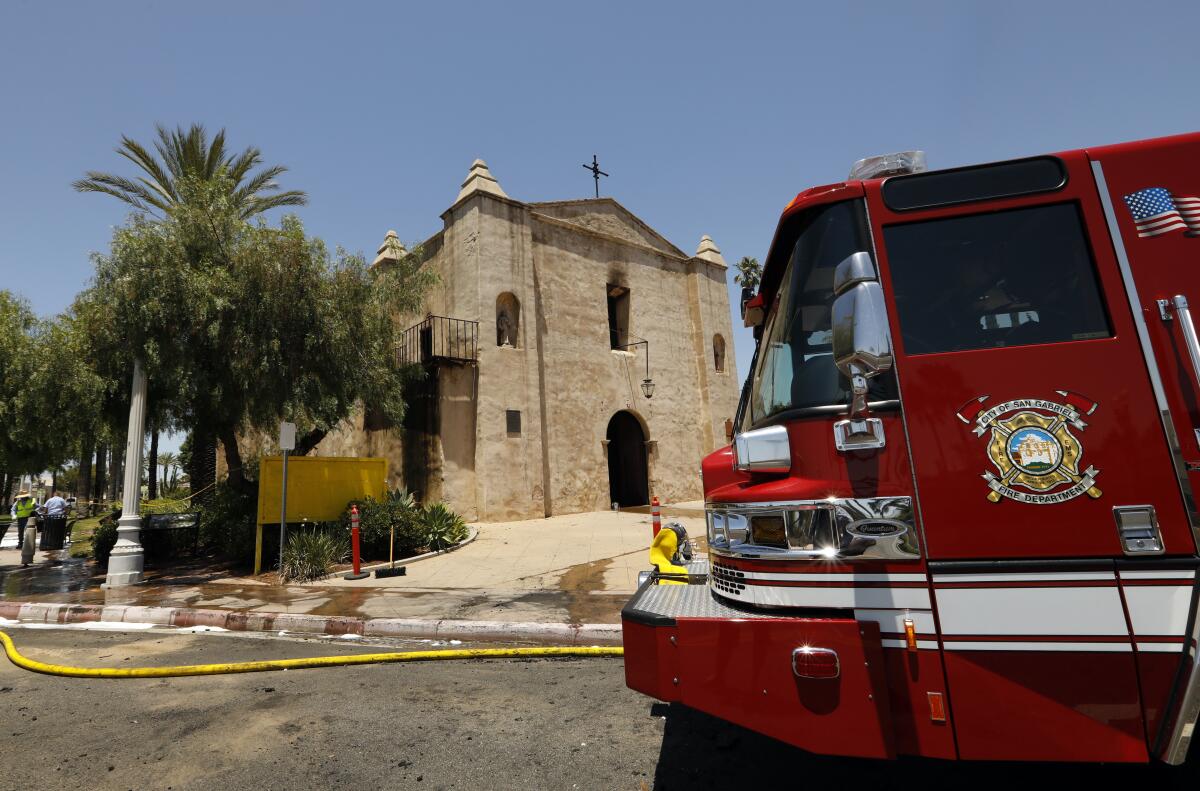No answers yet in ongoing investigation into San Gabriel Mission fire

The cause of the fire that tore through the San Gabriel Mission on a recent early morning remains under investigation, city of San Gabriel officials say, and no arrest has been made in the case despite media reports.
The city issued a statement Wednesday afternoon saying that “the investigation remains ongoing and a definite cause is still being determined by investigators.”
The fire happened July 11, but investigators were only able to begin examining the historical and religious site on July 15 after engineers and structural specialists “were able to stabilize loose debris” from the fire, which began on and destroyed the mission’s roof.
Earlier Wednesday, some media reports pointed to the arrest of a man near Alhambra as being in connection to the fire.
San Gabriel officials confirmed a person was arrested, but said it was in connection with a separate suspected arson incident on July 12.
“This individual was arrested for an unrelated charge,” the statement said.
Control of the church was also being returned by investigators to mission officials.
Wednesday’s announcement was the first official update provided by the city regarding the fire since July 13.
The blaze that ripped through the church was first reported on July 11 at 4:24 a.m. While there were no injuries, the roof was destroyed, and just-refurbished pews and much of the interior were seriously damaged.
Whether by luck or divine intervention, the altar and many historical wooden statues positioned nearby survived unscathed.
Paintings that adorned the mission’s interior walls had been relocated due to ongoing renovations and thus were also spared, and an 18th century baptismal font and silver pieces donated by King Charles III of Spain also survived.
After the fire, hundreds of parishioners, community members and Roman Catholics from throughout Southern California made pilgrimages to the mission to grieve and pray.
Los Angeles Archbishop José H. Gomez toured the damage along with San Gabriel Valley regional Auxiliary Bishop David G. O’Connell, who addressed the distressed faithful.
O’Connell said that socially distanced masses would continue to be held at the adjacent chapel and that the 11 a.m. mass on Sunday was presided over by Gomez.
That day’s services were some of the last for the chapel as the Los Angeles Archdiocese suspended all outdoor masses due to state coronavirus regulations on July 14.
The investigation into the fire was led by the Verdugo Fire Task Force, a grouping of fire departments from smaller surrounding cities that pool resources and investigators together for larger projects.
According to Capt. Antonio Negrete, public information officer for the San Gabriel Fire Department, the six-member group consisted of fire investigators from the cities of San Gabriel, San Marino, Monterey Park, Monrovia and Glendale. The Los Angeles Fire Department also assisted.
Negrete said personnel from the federal Bureau of Alcohol, Tobacco, Firearms and Explosives were also involved in the investigation, which is normal when fires involve religious institutions.
The fire came as the legacy of the California missions and other colonial monuments have come under question.
A statue of the mission’s founder, Father Junípero Serra, was preemptively moved by mission leadership before the end of June.
Serra statues have been forcibly ripped down in San Francisco, Olvera Street and Sacramento in recent weeks. The Ventura City Council agreed last week to move two statues of Serra away from city property.
Serra, an 18th century Spanish priest, founded the first nine of the state’s eventual 21 missions. He is known for spreading Catholicism throughout California and the West at the expense of indigenous cultures.
Many Native American tribes were decimated through diseases introduced by Spaniards such as Serra, while his mission system destroyed villages, native plants and animals.
Native Americans were also often forced into constructing the missions, were severely disciplined and faced high mortality rates.
Serra’s defenders call him a protector of “Native Americans in both Mexico and Alta California” who fought against Spanish brutality.
More to Read
Sign up for Essential California
The most important California stories and recommendations in your inbox every morning.
You may occasionally receive promotional content from the Los Angeles Times.











